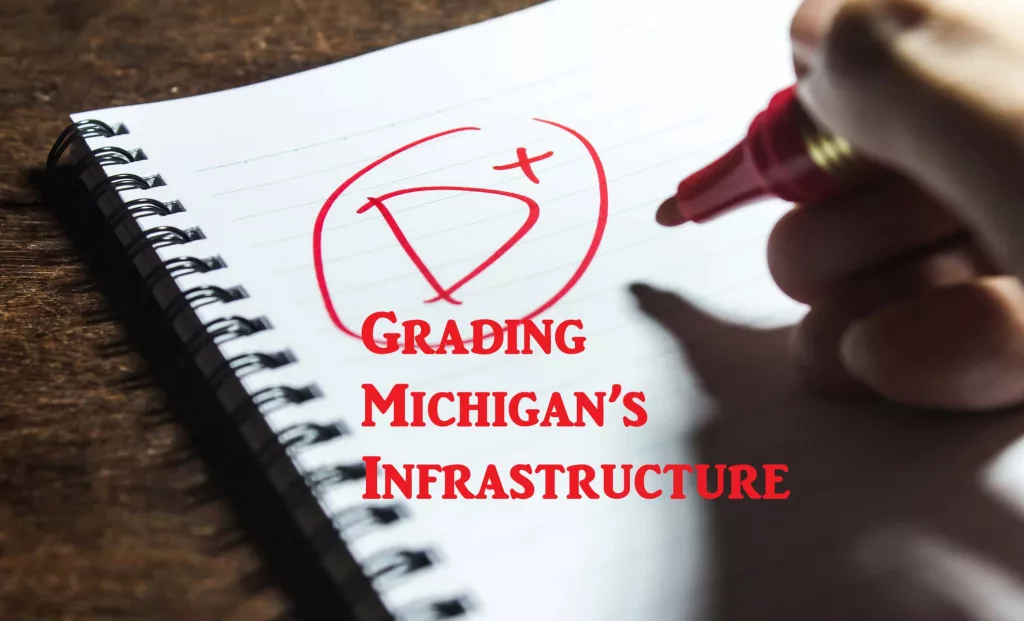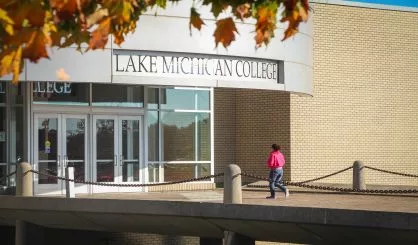As we travel the crumbling highways and byways of Michigan’s Great Southwest, ever hopeful for relief from the battering our vehicles take on an everyday basis, we often wonder if anyone in a position of authority is paying any attention whatsoever to the current conditions of the state’s infrastructure. So, in a sadly perverted way we can gain a small measure of “comfort” knowing that at least knowledgeable experts pretty much concur with us when we swear things couldn’t get much worse.
Today, the Michigan Section of the American Society of Civil Engineers has released its 2018 Report Card for Michigan’s Infrastructure, grading 13 categories of the state’s infrastructure, resulting in an overall grade point average of “D+.” The grades ranged from the highest grade of “C+” for Solid Waste to the lowest grade of “D-” for Roads and Stormwater.
The 2018 Report Card for Michigan’s Infrastructure finds that much of the state’s infrastructure is reaching the end of its useful life and continues to threaten Michigan’s lakes, rivers, drinking water, and public health and safety.
Major findings include:
- The category of Roads received a grade “D-” because 39-percent of the 120,000 miles of paved roads in Michigan are rated in poor condition, with 43-percent rated in fair condition and just 18-percent rated in good condition.
- Michigan’s Drinking Water systems scored a “D.” It’s estimated that drinking water system owners in Michigan are underfunding system improvements for Safe Drinking Water Act compliance by anywhere from $284-to-$563 million every year.
- Currently, Michigan lacks a way to inventory, operate and maintain our Stormwater infrastructure. Stormwater management systems provide flood protection, improve quality of life for residents and impact the water quality of Michigan’s rivers, lakes, streams and the Great Lakes.
- Michigan has 1,234 structurally deficient bridges, and the Michigan Department of Transportation estimates the number of state-maintained bridges currently rated in poor condition will increase by 50-percent in the next five years.
Myndi Bacon is Co-Chair of the Report Card for Michigan’s Infrastructure. She says, “A ‘D+’ grade is unacceptable. Michigan is poised to address what’s broken and protect our residents’ safety by making necessary investments to improve our infrastructure. We can rebuild our roads, make our bridges safer, and prevent costly water main breaks—all things that will save us money in the long run.” She adds, “Michigan residents take pride in our most precious resource, our water. It’s time to make protecting our residents’ health and safety as well as our rivers, lakes and streams a top priority.”
Kentwood Mayor Stephen Kepley concurs, saying, “The dire conditions of our roads and bridges are a reality that Michiganders contend with daily. The ability to grow and support businesses in West Michigan and statewide weighs heavily on providing high quality infrastructure.” Kepley adds, “Reliable and sustainable funding is mandatory for Michigan’s economic success. Continued underfunding of our roads and infrastructure negatively impacts our long term sustainability plan for a strong economy. Poor policy and future legislative promises do not provide a strong foundation on which to build.”
Among the recommendations to raise the grades:
- Increase state funding. The Michigan Legislature passed increased funding in 2015, but we still need to do more to create a long-term legislative solution.
- Support innovative policies to ensure high-quality data gathering and asset management practices in place, for example the proposed creation of the Michigan Infrastructure Council.
- Prioritize public health and safety by properly maintaining Michigan infrastructure.
- Get involved. Make sure lawmakers know Michigan isn’t making the infrastructure grade and see how we stack up against other states.
A team of professional engineers from across Michigan assessed the 13 categories of infrastructure to reach the cumulative grade of “D+.” The categories include:
- Aviation (C)
- Bridges (C-)
- Dams (C-)
- Drinking Water (D)
- Energy (C-)
- Navigation (C)
- Rail (C-)
- Roads (D-)
- Schools (D+)
- Solid Waste (C+)
- Stormwater (D-)
- Transit (C-)
- Wastewater (C)
The 2018 Report Card for Michigan’s Infrastructure was created as a public service to citizens and politicians of the state to inform them of the infrastructure needs in their community. By using school report card letter grades, civil engineers have used their expertise to condense complicated data into easy-to-understand analysis.
State level report cards are modeled after the national 2017 Infrastructure Report Card, which gave America’s infrastructure a grade of D+.
To view the full report, click the link below:






